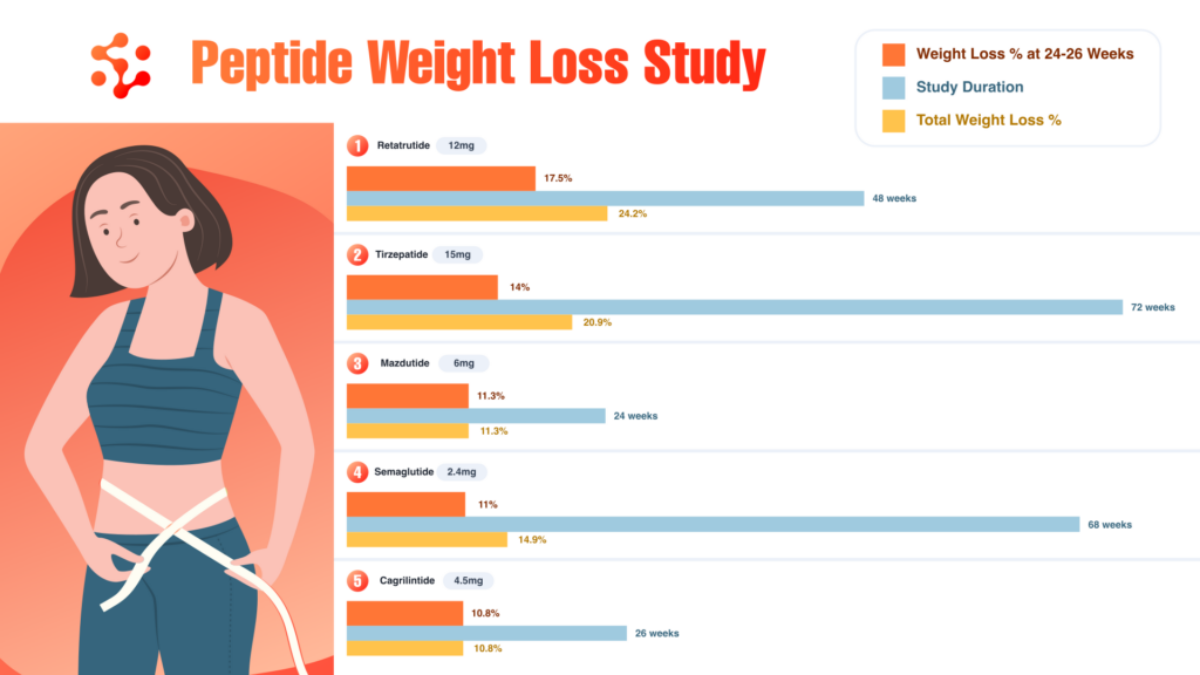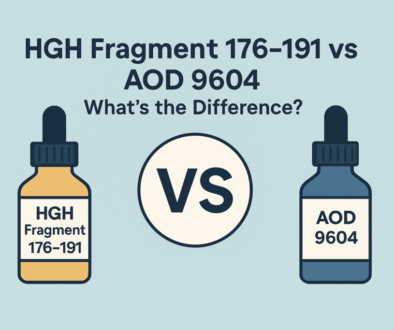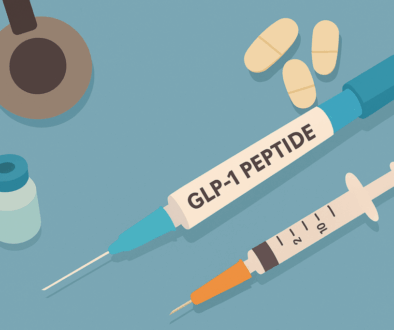Tirzepatide vs. Semaglutide vs. Cagrilintide vs. Retatrutide vs. Mazdutide for Weight Loss: Which Works Best?

GLP-1 weight loss peptides have been taking the world by storm in the past few years. But just how effective are they are helping people lose weight? And which ones are safer in terms of side effects?
To answer these questions, we dug into the research for five popular peptides for weight loss: tirzepatide, semaglutide, mazdutide, cagrilintide, and retatrutide.
We sifted through multiple clinical studies and compared their findings to see how these peptides stack up on weight loss and safety. You can see the summary below; keep reading for a detailed analysis.
Quick Summary:
- Retatrutide (12 mg dose) produced the greatest overall average weight loss (−17.5% after 24 weeks, -24.2% after 48 weeks)
- Mazdutide was the safest peptide, leading to only one person quitting the trial, even though 95.2% of participants reported (mostly mild or moderate) side effects
- All peptides were associated with mostly gastrointestinal side effects, like diarrhea
Table of Contents
Best Weight Loss Peptide: Head-to-Head Comparison
| Rank | Peptide | Dose | Weight Loss % at 24-26 Weeks | Total Weight Loss % | Study Duration |
| 1 | Retatrutide | 12mg | 17.5 | 24.2 | 48 |
| 2 | Tirzepatide | 15mg | 14 | 20.9 | 72 |
| 3 | Mazdutide | 6mg | 11.3 | 11.3 | 24 |
| 4 | Semaglutide | 2.4mg | 11 | 14.9 | 68 |
| 5 | Cagrilintide | 4.5mg | 10.8 | 10.8 | 26 |
Join Our Newsletter — Get 15% Off
Get the latest offers, peptide research insights, and stock updates.
Overall, high-dose (12 mg) retatrutide showed the greatest weight loss in the studies we looked at, even after accounting for different study durations. For a more detailed comparison and discussion, keep reading below.
Tirzepatide vs. Semaglutide Weight Loss & Side Effects
For starters, let’s compare tirzepatide vs. semaglutide, the two most popular weight loss peptides. We found two similar, large-scale studies, one with a 2.4 mg dose of semaglutide versus placebo for 68 weeks, and another with 5, 10, and 15 mg doses of tirzepatide vs. placebo for 72 weeks.
Each person took one injection of either peptide a week. Here are the findings:
| Compound | Mean Weight Loss | Side Effects | Duration | Participants |
| Tirzepatide |
15.0% (5 mg) to 20.9% (15 mg) People with 5% or more weight loss: 85% (5 mg), 89% (10 mg), and 91% (15 mg) |
4.3-7.1% of participants discontinued due to side effects (mostly digestive) | 72 weeks | 2539 |
| Semaglutide |
14.9% People with 5% or more weight loss: 86.4% |
4.5% of participants discontinued due to side effects (mostly digestive) | 68 weeks | 1961 |
As we can see, Tirzepatide was significantly more effective than semaglutide, producing greater weight loss and resulting in a higher percentage of individuals achieving 5% or greater weight loss.
Interestingly, higher tirzepatide (10 and 15 mg) doses seemed to cause more people to quit the study due to side effects than semaglutide.
This is contrary to what we hear from individual reports of people from reddit and other online forums. In most of these anecdotal reports, people claim that semaglutide has worse side effects than tirzepatide, which is one of the main reasons they switched over.
Cagrilintide vs. Retatrutide vs. Mazdutide Weight Loss & Side Effects
So we can say pretty concivisibly that tirzepatide is superior to semaglutide. But what about newer weight loss peptides that are just hitting the market, like cagrilintide, retatrutide, and mazdutide?
Comparing these is a little more difficult because there is less research data, but we can get a pretty good comparison. As expected, the higher doses produced higher weight loss in each study.
| Compound | Mean Weight Loss | Side Effects | Duration | Participants |
| Cagrilintide | 6.0%–10.8% (dose-dependant) | 41%–63% had GI issues; 10% stopped treatment, 4% withdrew from study | 26 weeks | 706 |
| Retatrutide |
24 wks: 7.2%-17.5% (dose-dependent) 48 wks: 8.7%-24.2% |
6%-16% withdrew due to side effects (dose-dependant) | 48 weeks | 338 |
| Mazdutide |
6.7% (3 mg) 10.4% (4.5 mg) 11.3% (6 mg) |
95.2% reported side effects, with 1 person quitting due to side effects; side effects | 24 weeks | 248 |
As we can see:
-
- Retatrutide showed the overall best results, leading to average 7.2-17.5% dose-dependant weight loss by 24 weeks and 8.7-24.2% by 48 weeks
-
- Mazdutide came in second with 6.7-11.3% dose-dependant weight loss by 24 weeks
-
- Cagriintide had 6-10.8% dose-dependant weight loss by 26 weeks (fairly close to 24 weeks)
All together, retatrutide produced the greatest weight loss after 24 weeks, even after accounting for the fact that people in the Mazdutide study started at a lower overall BMI.
Side Effects
But what about safety and side effects? Just like their older brethren, all three of these newer weight loss peptides produced gastrointestinal side effects in most study participants.
Keep in mind it’s more difficult to compare safety; for example, some people might quit the study based on side effects but not report it correctly. Still, here are the findings:
-
- With mazdutide, only 1 person said they quit the study because of side effects, out of a total 19 people who quit the study early.
-
- In the cagrilintide study, 4% withdrew from the study due to side effects.
-
- For the retatrutide study, 6-16% of people withdrew from the study because they didn’t like the side effects, with the higher percentage for people taking higher doses.
In summary, it looks like mazutide is the safest of the three new generation weight loss peptides, as only one person clearly quit the study because of side effects. That’s not surprising because it’s the newest peptide out of the three, and researchers tend to improve the safety profile with each new peptide.
Even if we account for some people quitting the mazdutide study without clearly stating it was because of side effects, it’s still the safest of the three. Cagrilintide comes in second place with 4% discontinuing due to side effects.
In summary, it looks like out of mazdutide, retatrutide, and cargrilintide, retatrutide is the best for weight loss but also produced the most side effects, whereas maztutide is the safest but led to less weight loss.
Tirzepatide vs. Semaglutide vs. Cagrilintide vs. Retatrutide vs. Mazdutide Weight Loss
Now, let’s compare all five peptides together. Again, a direct 1:1 comparison is not possible because the studies were done for different lengths of time, slightly different designs, and reported their data in slightly different ways.
Still, we can get a general picture by comparing the estimated 24/26 week findings for tirzepatide and semaglutide (taken from the study graphs) to the 24-26 week findings for cagrilintide, retatrutide, and mazdutide.
| Compound | Weight Loss | Data Point | Side Effect Severity | Number of Participants |
| Tirzepatide | ~10.5-14%* (dose-dependant) | 24 weeks | 4.3-7.1% discontinued | 2539 |
| Semaglutide | ~11%* | 26 weeks | 4.5% discontinued | 1961 |
| Cagrilintide | 6.0% –10.8% (dose-dependant) | 26 weeks | 4% discontinued | 706 |
| Retatrutide | 7.2%−17.5% (dose-dependent) | 24 weeks | 6%-16% discontinued | 338 |
| Mazdutide | 6.7%-11.3% | 24 weeks | 1 person discontinued | 248 |
*Estimated weight loss based on graphs provided in the studies
As we can see:
-
- High-dose retatrutide (12 mg) is the winner, producing the most weight loss after 24 weeks.
-
- High-dose tirzepatide (24 weeks) takes second place.
- Mazdutide takes third place, but is the safest in terms of side effects.
- Semaglutide (26 weeks) barely beats out cagrilintide.
Overall, the results are a bit surprising. We expected the three newer-generation peptides to beat out the older ones in weight loss, but tirzepatide got 2nd place and semaglutide beat out cagrilintide.
Data Limitations
It’s important to note that while this data is useful for a general picture, it’s not perfect:
-
- Some studies lasted longer than others or recorded weight loss data at different time points. As a result, a 1:1 comparison isn’t always possible and we had to estimate some data points from graphs.
-
- The data on people withdrawing a study is not always 100% clear. For example, even though the mazdutide study only reported one person quitting due to side effects out of 19 people who didn’t finish the trial, it’s possible there were more.
-
- The tirzepatide & semaglutide studies had more participants, so their data is stronger and more reliable than that of the newer peptides.
-
- The participants in the Mazdutide study had a BMI of 24+ (overweight) or 28+ (obese), which is lower than the 27+ and 30+ cutoff used in the other studies. That means their results are arguably a bit better than the numbers suggest.
-
- Wilding, John PH, et al. “Once-weekly semaglutide in adults with overweight or obesity.” New England Journal of Medicine 384.11 (2021): 989-1002.
- Jastreboff, Ania M., et al. “Tirzepatide once weekly for the treatment of obesity.” New England Journal of Medicine 387.3 (2022): 205-216.
- Jastreboff, Ania M., et al. “Triple–hormone-receptor agonist retatrutide for obesity—a phase 2 trial.” New England Journal of Medicine 389.6 (2023): 514-526.
- Ji, Linong, et al. “A phase 2 randomised controlled trial of mazdutide in Chinese overweight adults or adults with obesity.” Nature Communications 14.1 (2023): 8289.
- Lau, David CW, et al. “Once-weekly cagrilintide for weight management in people with overweight and obesity: a multicentre, randomised, double-blind, placebo-controlled and active-controlled, dose-finding phase 2 trial.” The Lancet 398.10317 (2021): 2160-2172.



